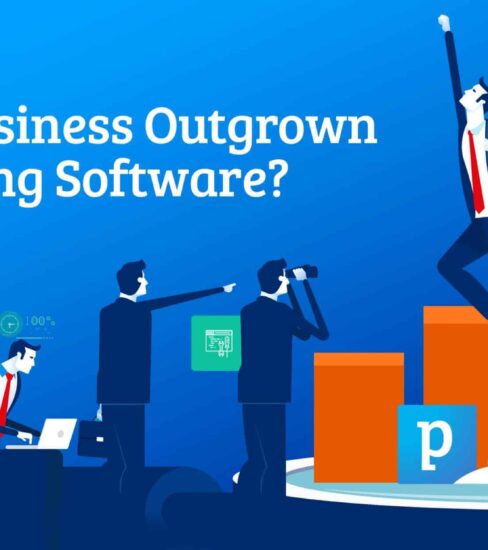Many businesses start their journey with simple accounting software, like QuickBooks, Xero or FreshBooks, to manage their financial data. They often complement their basic system with tools like Microsoft Excel to track inventory and Outlook to manage contacts and appointments.
Entry-level accounting software packages are designed to get your company up and running. However, as your business grows in complexity and transaction volumes, the rudimentary software might not meet your complex needs, such as planning, budgeting, and forecasting. The system that once supported you may now put your company at risk and hold you back. Whether due to changing external factors or internal needs, it's essential to recognize when it is time to move on.
If you are concerned that your current accounting software slows you down, it might be time to consider other options, such as an integrated ERP system that will offer complete visibility into every aspect of your business. So, how can you tell if you've outgrown your system?
8 common signs that your business has outgrown its accounting software.
1. Incapability to Handle Transaction Volumes
As your business expands, the number of transactions - including sales, purchases, and financial transfers - grows exponentially.
This growth can put a strain on basic accounting systems which are not designed to accommodate high transaction volumes.
If you're waiting until the end of the month to process bulk transactions instead of entering them in real-time, it’s a clear indicator that your accounting software cannot keep up with the number of financial transactions and data collection of your growing business.
The incapability to handle growing transaction volumes also exposes businesses to various risks associated with inaccuracies in financial records due to data entry errors or missing transactions in their current systems.
If you neglect to ensure that your business management software is up to scratch, you're wasting time and resources on inefficiencies easily fixed with a modern business management solution.
By acknowledging this critical sign of outgrowing your current solution early enough and choosing the right new software for managing increased transaction volumes effectively – be it a fully customized package or Enterprise Resource Planning (ERP) solution – you empower yourself against unnecessary challenges while moving toward better financial tools suited for long-term business success.
2. Manual Processes & Lack of Efficiency
As your business expands, so do its financial transactions and complexity. The increasing demands can quickly outpace the capabilities of your existing accounting software, leading to an overreliance on manual processes. This inefficiency not only affects productivity but also increases the risk of errors in data entry and calculations.
The increasing demands can quickly outpace the capabilities of your existing accounting software, leading to an overreliance on manual processes.
If you spend too much time on manual data entry and paperwork, or when you start noticing delays in completing routine tasks, consider it a sign that you've outgrown your accounting software.
For instance, if you find yourself manually consolidating data from multiple systems or spending excessive time on repetitive tasks like month-end closing procedures or bank reconciliations, it's time for an upgrade.
Your accounting software needs to help you streamline repetitive and manual tasks to remain error-free, save time on reconciliation, and create automated business processes.
Upgrading to a more advanced accounting system can streamline these processes by automating many tasks that were once performed manually.
Moreover, outdated accounting software solutions often lack integration capabilities with other essential business applications such as CRM (Customer Relationship Management) systems or inventory management tools.
These limitations create bottlenecks in information flow between departments and hinder effective collaboration among employees working across various areas within the organization.
3. Inefficient Invoice and Data Tracking
Inefficient invoice and data tracking is another sign that you may be outgrowing your accounting software.
Invoicing is foundational for any company. The process also requires accuracy and timeliness. Inadequate invoice tracking can lead to late payments or missed opportunities for early payment discounts from suppliers. which impacts your cash flow.
Additionally, inaccurate data entry caused by manual processes may result in costly mistakes that affect both cash flow management and overall business performance.
Older software programs often have difficulties retrieving saved data, including consumer data, invoices, and sales records.
If you find yourself struggling with managing invoices efficiently and keeping track of all relevant financial information accurately within your current accounting system limitations – it's time to consider migrating to an advanced accounting solution designed specifically for larger organizations' unique needs.
New cloud-synced accounting software may solve your issue if you nod your head at this problem.
4. Relying on Spreadsheets for Inventory Tracking
Relying heavily on spreadsheets for inventory tracking is a clear indicator that your current accounting software may not be sufficient for your growing business.
Not only are mistakes like the shipment of incorrect items costly, but they could also affect your customer relationships and brand image. ERP software is the solution you seek when looking to improve your inventory management, visibility and tracking, and even predict demand, allocate resources, and optimize stock.
5. Limited Ability to Accommodate New Operational Needs
You may begin to offer new products or services, enter new markets, or require more sophisticated financial management.
When your accounting software struggles to accommodate these changes, it could be a sign that you're outgrowing the system.
If your accounting tool cannot connect with popular third-party apps like PayPal and Zendesk, your business management software is limited to niche processes. It won't allow future expansion to support operational activities like distribution, manufacturing, logistics, professional services, project accounting, and more.
Another aspect of this issue is scalability – if expanding your team and operations becomes hindered by the constraints of an inflexible accounting system, upgrading to a more robust solution with additional functionality should become an immediate priority.
6. Difficulty Complying with Regulatory Requirements
Outdated accounting software solutions often lack the capability to adapt to new compliance requirements automatically.
If you spend too many resources to remain compliant, as transparency becomes more critical and compliance becomes more complex, it may be a sign that you've outgrown your system.
Some industries face regulations that can be costly to uphold.
A good accounting tool should help you comply with your country's tax agencies. If your accounting software cannot do this, you should consider a cloud accounting tool that automatically syncs all the critical data to have your reports ready when they need to be submitted.
7. Delayed Reporting
If you do your reporting with an Excel spreadsheet, Chances are you are facing a constant delay in reporting and impairing the ability to operate in the long run efficiently. If your close process includes extensive manual wading through endless spreadsheets, correcting duplicates, time-consuming accounts receivable and payable functions, you risk errors and sabotage your credibility.
Furthermore, delayed reporting may affect other aspects of your business as well.
For instance, if you're unable to get accurate updates on cash flow due to limitations in your system's functionality or insufficient integration between different applications used across teams—such as payroll systems—you might struggle with making necessary adjustments regarding costs allocation and resource management.
Upgrading will enable you not only better understand where money comes from but also how it’s spent throughout all areas involved in running a successful organization; This translates into smarter decisions around budgeting strategy development based on actual figures rather than approximations made through manual calculations performed under pressure due time constraints imposed by inadequate systems.
8. Limited Collaboration
If you rely on emails to prompt transaction approvals and move tasks forward, and the internal workflow process can use some streamlining, it's time for a change.
Outdated and old accounting software solutions often lack the necessary features to facilitate real-time collaboration between team members, restricting their ability to work together on critical financial tasks.
For instance, when multiple users need access to the same financial data simultaneously, some entry-level accounting systems may not support it or require you to purchase additional licenses at a high cost.
Workflow automation eliminates frustrating project creep by keeping everything moving forward in one platform and out of your inbox.
What Should You Do Next?
If you nodded "yes" to any of the above, it might just be time for a change. Adopting a new business management ERP software is an opportunity to boost the organization's competitive advantage. Deciding to replace your accounting software or business may seem like a daunting task. But what is the actual cost of maintaining a system that is no longer up to par with demands?
My take on things is, that a modern, flexible and open financial management system is what every business needs to support current needs and scale as the business grows. There has never been a better time for companies to update their capabilities, maintain greater efficiency, and prepare for growth and changing business conditions.


